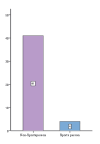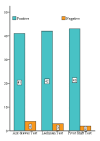Arthroscopic Reconstruction of an Anterior Cruciate Ligament Tear Using the Anatomic Single-Bundle Technique: A Clinical and Functional Outcome Evaluation
- PMID: 39391455
- PMCID: PMC11465764
- DOI: 10.7759/cureus.69069
Arthroscopic Reconstruction of an Anterior Cruciate Ligament Tear Using the Anatomic Single-Bundle Technique: A Clinical and Functional Outcome Evaluation
Abstract
Background: The anterior cruciate ligament (ACL) consists of an anteromedial bundle and a posterolateral bundle giving anteroposterior and rotational stability to the knee. An ACL tear might lead to secondary changes in the knee joint if not operated in time. The aim of the study was to evaluate the clinical and functional results in patients with ACL tears treated by arthroscopic reconstruction using the anatomic single-bundle technique.
Methods: This was a prospective study conducted between June 2015 and December2017 at a teaching institute in Kolkata, India, on patients who underwent single-bundle arthroscopic reconstruction of an ACL tear. A minimum follow-up of nine months was considered for all patients. The functional outcome was assessed via the Lysholm knee score.
Results: A total of 45 patients were included in this study, of which 34 (75.56%) and eight (17.78%) patients showed excellent and good results, respectively, at the final follow-up. The mean age in this study was 29.88±9.02 years. No complication was seen in 95.6% of patients. The mean Lysholm score by the end of nine months was 95.31±6.55. At the time of the final follow-up, all the patients returned to their same activity status prior to injury.
Conclusion: Arthroscopic anatomic single-bundle ACL reconstruction using hamstring autograft is an effective treatment modality for ACL injuries. It restores the stability of the knee and is associated with good recovery of joint function with an early return to active lifestyle and sports activities. This procedure achieves excellent clinical and functional outcomes without any long-term disability.
Keywords: anterior cruciate ligament; arthroscopy; hamstring graft; lysholm score; single-bundle reconstruction.
Copyright © 2024, Baid et al.
Conflict of interest statement
Human subjects: Consent was obtained or waived by all participants in this study. Clinical Research Ethics Committee of Medica Superspecialty Hospital issued approval CREC/2015/July/07. Animal subjects: All authors have confirmed that this study did not involve animal subjects or tissue. Conflicts of interest: In compliance with the ICMJE uniform disclosure form, all authors declare the following: Payment/services info: All authors have declared that no financial support was received from any organization for the submitted work. Financial relationships: All authors have declared that they have no financial relationships at present or within the previous three years with any organizations that might have an interest in the submitted work. Other relationships: All authors have declared that there are no other relationships or activities that could appear to have influenced the submitted work.
Figures
References
-
- Anatomy and biomechanics of the native and reconstructed anterior cruciate ligament: surgical implications. Kraeutler MJ, Wolsky RM, Vidal AF, Bravman JT. J Bone Joint Surg Am. 2017;99:438–445. - PubMed
-
- Functional anatomy of the anterior cruciate ligament. Fibre bundle actions related to ligament replacements and injuries. Amis AA, Dawkins GP. J Bone Joint Surg Br. 1991;73:260–267. - PubMed
-
- Anatomic, radiographic, biomechanical, and kinematic evaluation of the anterior cruciate ligament and its two functional bundles. Chhabra A, Starman JS, Ferretti M, Vidal AF, Zantop T, Fu FH. J Bone Joint Surg Am. 2006;88:2–10. - PubMed
-
- Distribution of in situ forces in the anterior cruciate ligament in response to rotatory loads. Gabriel MT, Wong EK, Woo SL, Yagi M, Debski RE. J Orthop Res. 2004;22:85–89. - PubMed
-
- Anatomy of the anterior cruciate ligament with regard to its two bundles. Petersen W, Zantop T. Clin Orthop Relat Res. 2007;454:35–47. - PubMed
LinkOut - more resources
Full Text Sources




